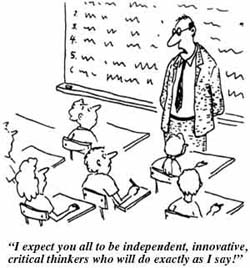Empowerment:
verb (used with object)
- to give power or authority to; authorize, especially by legal or official means:
“I empowered my agent to make the deal for me. The local ordinance empowers the board of health to close unsanitary restaurants.â€
- to enable or permit:
“Wealth empowered him to live a comfortable life.”
 In your organization how confident do those who look to you for leadership feel empowered? If one gives responsibility for a task, then they should also be given the authority/power to carry it out (and not have to constantly report to someone to see if forward steps are appropriate).
In your organization how confident do those who look to you for leadership feel empowered? If one gives responsibility for a task, then they should also be given the authority/power to carry it out (and not have to constantly report to someone to see if forward steps are appropriate).
Assignment + Freedom and Authority = Empowerment
When people are given freedom to take care of an assigned task and then trusted to carry it out then they have been empowered. When a person feels empowered to handle a specific responsibility then several things can happen in an organization:
1) Confidence in decision-making. The person who holds the responsibility and the authority to carry it out will be much more confident in their decision-making. Those that hold a responsibility but lack the authority to execute the task constantly struggle with making a decision. If the leader knows that they are trusted to make the decision, then they can look forward and innovate, instead of looking over their shoulder to see if they are going in the right direction and have approval.
2) Raise questions – those that feel empowered tend to ask questions more readily. They want to make sure they have all the information needed to complete the task. They want to do a good job, so they make sure they have everything they need. Also, those who are empowered who are apart of a larger team, feel more freedom to look at others areas, that are not their own and ask questions.
The more questions that are being asked, the better the organization will be as a whole. Questions like, “why do we do it this way?†or “this seems really expensive, is there a way to keep the quality but do it cheaper?†These questions should be done with respect and professional tact, but when questions are raised it helps the leadership as a whole see things differently (or at least more systematically).
3) See new possibilities – The issue of empowerment typically comes up with new leadership. Organizations that are not empowering new leadership will eventually lack innovation. “Fresh Eyes†have the ability to see all the flaws that the established leadership have either ignored or no longer see the issues as being relevant.
For example, once you know where the bathrooms are you no longer think, “how will our guests know where the bathrooms are located?†But new “eyes†will allow you to address issues that established leadership “knows†(or may not know) but have chosen not to address. These new leaders will ask questions and raise issues that may need to be dealt with (but for whatever reason up to this point have not been dealt with).
Also, when people feel empowered, are making decisions that are moving the organization forward, and when questions are encouraged, new possibilities arise. They may say, “what if we did this instead of this?†or “Why don’t we put up signs so new people can find the bathrooms?†New ideas will come forward and the organization either says, “yes” or “no”– but for a moment it readdresses what is important, a flash of the organizational culture is brought to the forefront, and the new leaders will see “how things are done.”
4) Disagreement – When people do not feel empowered to make decisions then they do not feel the freedom to disagree. When a leader is never challenged, and people do not feel the freedom to ask questions, or suggest new possibilities – then they surely will not disagree with the leader (at least face-to-face).
But disagreement, if discussed, will force the organization to evaluate both sides of the disagreement and reach a solution. Disagreement allows the organization to sift through what is truly important and what is not. It has to decide what parameters it is using to make the decision. It evaluates what both sides of the argument would affect. In the end disagreement will lead to a deeper understanding of why and how things are done a particular way.
Some questions to ask:
1) How empowered do those in my organization feel?
2) Are people given both responsibility and the authority to carry it out? (how much oversight do those in the organization receive) By the way, a lack of oversight can be just as damaging to empowerment as too much oversight.
3) Do people feel a freedom to ask questions? What is your organization’s way of encouraging questions? When was the last time someone asked a really good question that made everyone around the table stop and think?
4) Do people feel free to disagree with the main leader? If so, what is the typical response? Are people “punished” for disagreeing? Is there a organizational culture in place that rewards agreement and discourages evaluation?